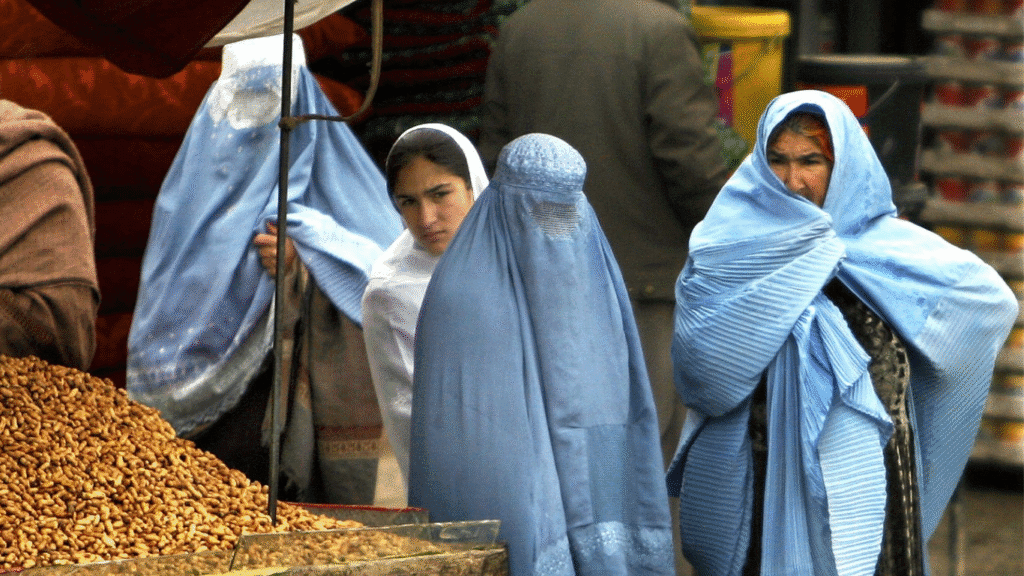
Author of the text: Dorothee Fischer
Senior Communications Expert
and Certified Business Coach –
Legado Sharpe & Fischer
Sometimes writing an article takes longer than expected. The topic keeps tugging at you—appearing in conversations, resurfacing in different encounters. That was the case for this edition of Women Who Inspire the World. For months, stories about the situation of women and girls in Afghanistan kept crossing my path—until I finally sat down, listened closely, and tried to make sense of it all.
Since the Taliban regained control of Afghanistan in August 2021, the situation for women and girls has drastically worsened. Girls have been banned from attending secondary school and university. Women have been barred from most jobs, restricted from travelling alone, and pushed out of public life. Even international organisations have been forced to suspend female staff in the country. Some now speak of a gender apartheid unfolding before our eyes.
And yet, in the face of these restrictions, a quiet resistance continues. Through underground schools and online classrooms, many Afghan women and girls are defying the ban on education – often at great personal risk.
In these past weeks, I was able to speak with several Afghan women – some living in the country, some in exile – who shared their stories with me. Their voices were not broken but burning with resilience. I was particularly moved by two young women, Elham and Fatima, who are continuing their education online despite the Taliban’s harsh restrictions. And by the remarkable woman who supports them: Mohadessa Hassani, an Afghan student now based in California, who is one of many quietly leading an educational revolution.Sometimes writing an article takes longer than expected. The topic keeps tugging at you—appearing in conversations, resurfacing in different encounters. That was the case for this edition of Women Who Inspire the World. For months, stories about the situation of women and girls in Afghanistan kept crossing my path—until I finally sat down, listened closely, and tried to make sense of it all.
Since the Taliban regained control of Afghanistan in August 2021, the situation for women and girls has drastically worsened. Girls have been banned from attending secondary school and university. Women have been barred from most jobs, restricted from travelling alone, and pushed out of public life. Even international organisations have been forced to suspend female staff in the country. Some now speak of a gender apartheid unfolding before our eyes.
And yet, in the face of these restrictions, a quiet resistance continues. Through underground schools and online classrooms, many Afghan women and girls are defying the ban on education – often at great personal risk.
In these past weeks, I was able to speak with several Afghan women – some living in the country, some in exile – who shared their stories with me. Their voices were not broken but burning with resilience. I was particularly moved by two young women, Elham and Fatima, who are continuing their education online despite the Taliban’s harsh restrictions. And by the remarkable woman who supports them: Mohadessa Hassani, an Afghan student now based in California, who is one of many quietly leading an educational revolution.

“We don’t stop learning, we adapt.”
These were the quiet but determined words of Mohadessa Hassani, 19, whose own life was upended when the Taliban returned to power. She was in the 11th grade when the announcement came: girls were no longer allowed to attend secondary school. “I remember that day so clearly. Everyone was confused, trying to make sense of it. But deep down, we knew this wasn’t going to end quickly.”
Refusing to give up on her education, Mohadessa applied to universities abroad with the support of her family. She was eventually granted a scholarship to study psychology in the United States. “Leaving wasn’t easy,” she said. “It meant being far from my family and knowing I might not be able to return for a very long time.”
In her free time, she helps lead a growing online education initiative that connects Afghan girls with over 450 international volunteer teachers. “Most of our students study in secret; no cameras, no real names. Just voices and determination.”
The programme offers courses in English, mathematics, science, and business, along with internet stipends and emotional support. “Some of our girls have gone on to earn scholarships abroad,” she told me. “That’s the most rewarding part – seeing them regain hope and watching their dreams take root.”
The initiative that Mohadessa co-founded has reached hundreds of young women across Afghanistan so far – each one navigating enormous challenges to continue their education.

Against all odds: studying in secret for a better future
One of the students who receives support from Mohadessa is Fatima (25) from Kabul, currently studying midwifery through an online programme. She lives with her mother, sister, and brother. Her father passed away recently, leaving the family in a difficult financial situation. While her sister works as a midwife, Fatima is pursuing the same path—despite it being technically illegal for women to study under Taliban rule.
After the Taliban returned to power in August 2021 and banned girls and women from most forms of education and work, Fatima had to leave Ghazni, where internet access was poor, and return to Kabul. There, she joined one of Mohadessa’s English classes and later secured a scholarship that covers both tuition and internet costs for midwifery studies.
“The internet is our only window to the world,” she said. “Without it, I wouldn’t be able to do anything.”
Studying online from home, she joins a class of nearly 50 women – many of whom had previously pursued other degrees but were forced to abandon them after the Taliban’s takeover. They now all study midwifery, one of the few professions still tolerated for women.
Fatima dreams of working in a hospital one day or even studying abroad. She is currently preparing for the TOEFL exam. “Learning English gave me hope again,” she explained. “It made me believe another life is possible.”
Despite the risks, she tries to motivate other young women in her community. “Many have given up. They stay at home and marry early. I want to show them it’s still possible to grow, even in the dark.”
Determination in the face of isolation
Another student who receives support from Mohadessa’s team is Elham, a 17-year-old from a small village in Ghazni province. In her community of about 100 people, she is the only girl continuing her education online. While most fathers in the area don’t allow their daughters to study – especially under male teachers – Elham’s parents, and especially her father, have supported her education from the beginning.
She completed sixth grade before the ban on girls’ schooling and now continues her studies through two online programmes. A scholarship provided through Mohadessa’s initiative covers both her classes and internet access – an essential lifeline in a place with limited infrastructure. “Without that, I couldn’t study at all,” she said.
Elham’s days are filled with domestic work. She wakes up at 4 a.m. to cook, tend the garden and animals, bake bread, and care for her younger siblings. She squeezes in study time in the afternoons and late at night, often working on lessons until after midnight.
Despite the isolation and challenges, her vision for the future is clear. “I want to improve my English, apply for a scholarship, and one day study abroad,” she told me. But more than anything, she dreams of returning to her village to become a teacher and build a school for girls like her. “If I study, maybe I can change something for the next generation.”

A quiet revolution of hope
What these stories reveal is not only the immense pressure Afghan women and girls are under – but also their strength, adaptability, and vision. While the world debates how to respond and whether to speak with the Taliban or not, they are already responding in the only way they can: by continuing to learn, teach, and build networks of support – often in secret.
Their resistance is not loud, but it is powerful. It shows up in early mornings and late nights, in quiet Zoom classrooms, in whispered lessons and hidden homework. It lives in every girl who dares to imagine a different future, and in every woman – like Mohadessa – who finds a way to reach back and lift others.
Beyond education, Afghan women are also demonstrating remarkable entrepreneurial creativity. With most formal employment options closed to them, many have turned to small, home-based businesses – offering, for example, embroidery services, tailoring, or tutoring – to earn an income and stay connected to their communities. In this sense, they are not giving up, but finding their own ways to keep going, even under impossible circumstances.
What you can do
If you feel moved to support women and girls in Afghanistan, here’s what you can do—no action is too small.
📚 Support education initiatives Contribute to or follow trusted programmes like Mohadessa’s initiative that provide free, anonymous online education to Afghan girls (I can provide a connection, please write me a private message).
🗣️ Amplify their voices Share this story. The more the world listens, the harder it becomes to silence these women.
🌍 Volunteer your skills If you are a teacher, coach, or mentor, consider joining an online education initiative. Many rely on international volunteers to keep going.
📨 Stay informed and connected Follow organisations working on women’s rights in Afghanistan, such as Women for Women International, or UN Women.













